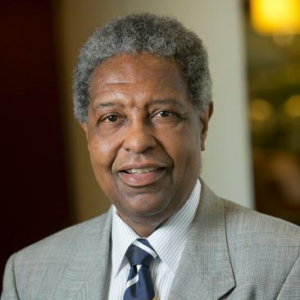William A. “Sandy” Darity, Jr., learned about poverty, inequality, and social justice from his parents, who taught him that people do not choose to be poor, but that there are systematic ways in which our society creates poverty. His extensive economic work applies knowledge to public policy to in creative ways, and has made him one of the most influential economists working on issues of race and economics in America today. Darity’s research focuses on inequality by race, class and ethnicity, stratification economics, schooling and the racial achievement gap, North-South theories of trade and development, skin shade and labor market outcomes, the economics of reparations, the Atlantic slave trade, the Industrial Revolution, and the social psychological effects of exposure to unemployment.
Professional positions
- 1999–present: Research Professor (1999–2007), Arts and Sciences Professor (2007–2014), and Samuel DuBois Cook Distinguished Professor (2014–present) of Public Policy, African and African American Studies, and Economics, Duke University
- 1983–2007: Associate professor of economics (1983–1987), full professor of economics (1987–1991), and Cary C. Boshamer Professor of Economics and Sociology (1991–2007), University of North Carolina at Chapel Hill
- 1978–1983: Assistant (1978–1981) and associate (1981–1983) professor of economics, University of Texas at Austin
Notable publications
- Darity, William A., Jr., and A. Kirsten Mullen. 2020. From Here to Equality: Reparations for Black Americans in the 21st Century. Chapel Hill, NC: University of North Carolina Press.
- Darity, William A., Jr., Patrick L. Mason, and James B. Stewart. 2006. “The economics of identity: The origin and persistence of racial identity norms.” Journal of Economic Behavior & Organization 60(3): 283–305.
- Darity, William A., Jr. 2005. “Stratification economics: The role of intergroup inequality.” Journal of Economics and Finance 29: 144–153.
- Tyson, Karolyn, William Darity, Jr., and Domini R. Castellino. “It’s not ‘a Black thing’: Understanding the burden of acting white and other dilemmas of high achievement.” American Sociological Review 70(4): 582–605.
Degrees
- PhD, economics, Massachusetts Institute of Technology
- BA, economics and political science, Brown University

